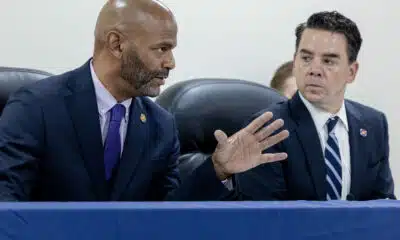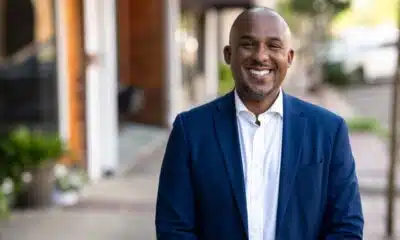Mississippi News
National politicos can look to Mississippi for answers on impact of disabilities on elected officeholders
National politicos can look to Mississippi for answers on impact of disabilities on elected officeholders
The Mississippi Legislature was in the midst of what was known as “the special session from hell” 20 years ago this month, debating whether to give businesses and medical providers more protection from lawsuits. Legislators ultimately did.
A key player in that special session that spanned a record-setting 83 days was Sen. Bennie Turner, a Democrat from West Point. Turner was respected in the Mississippi Legislature for his thoughtful analysis, civility and even-keeled approach to legislating.
He also had a serious hearing impairment.
A recent NBC national news interview with Pennsylvania Lt. Gov. John Fetterman, who is the Democratic nominee in a closely watched U.S. Senate race, stirred a debate about disabilities and serving in key electoral office.
Fetterman suffered a stroke earlier this year. Because of the stroke, he insisted the NBC interview be done in a manner that allowed him to read the reporter’s questions as they were being asked.
Apparently at times, Fetterman’s comprehension of audio communications can be troublesome, though he said the condition should improve in the coming months.
Whether it does or does not improve, though, should not be viewed as a factor in determining his qualifications to be in the U.S. Senate, some contend. Others argue it should.
The debate was stirred in part because the reporter, Dasha Burns, said it was not clear Fetterman could understand her during a period of small talk before the captioning device that allowed him to read her questions was turned on. How that report was portrayed by some in the national media helped spur the debate about Fetterman’s competency.
But during the actual interview, Fetterman read along as the questions were asked and answered forthrightly and sensibly. He stumbled briefly over the word “empathetic.”
Bennie Turner’s hearing loss happened after he was already serving in the Mississippi Legislature. He was elected in 1992, and in 1999 developed life-threatening meningitis, a disease that causes an inflammation of the brain lining and spinal cord. The disease left Turner with a hearing impairment, though he was never totally deaf.
Upon his return to the Legislature, Turner told the Northeast Mississippi Daily Journal, “My main concern is whether I can give the constituents of the 16th District the representation they deserve. At this point I feel like I can deliver, and I am going to try as hard as a I can to do that.”
He must have delivered in the eyes of his constituents. He was re-elected three times after contracting meningitis. Accommodations were made in the state Senate so that Turner, like Fetterman, could read the ongoing debates on his computer.
He remained an effective member of the Senate until he died in 2012 and was succeeded by his daughter, Angela Turner Ford. On numerous occasions, he would rise to express concern about the wording of a bill that could cause unintended consequences. Because of that keen understanding of legislation, the senators would always listen and often would change bills, based on Turner’s input.
Before Bennie Tuner came to the Legislature, Ellis Bodron served in the Mississippi House from 1948 until 1952 and in the state Senate from 1953 until 1984. Bodron, a Vicksburg attorney, was blind. People who served with him marveled at his ability to comprehend and explain complex and lengthy revenue bills.
He chaired the Senate Finance Committee. His chairmanship of the Finance Committee gave him a powerful position to oppose Gov. William Winter’s historic 1982 special session on education reform. Bodron opposed the legislation, but shepherded it through Finance at the behest of Lt. Gov. Brad Dye, who presided over the Senate.
Interestingly, Turner was the Judiciary chair during the infamous 2002 special session and opposed the legislation but played a key role in the process because of his chairmanship and the respect he endeared. He was one of the negotiators on the legislation.
In other words, Bodron’s and Turner’s roles in two historic special sessions were similar.
During Billy McCoy’s first term as House speaker, he suffered a stroke that left him with partial use of his left arm and with what some would say was a speech impediment.
Yet McCoy finished that term and served another as speaker, presiding during a turbulent time when partisan politics became more of a factor. He still played key roles in passing impactful legislation, including the bill that allowed casinos on the Gulf Coat to move on shore after Hurricane Katrina.
Voters in Pennsylvania will decide whether John Fetterman is competent to serve in the Senate. Their vote for or against him might not even be predicated on his stroke-induced impairment, though his Republican opponent, a medical doctor, Mehmet Oz, is certainly trying to make it an issue.
Mississippians have already decided, based on results, that a person with a disability can be an impactful member of their Legislature.
This article first appeared on Mississippi Today and is republished here under a Creative Commons license.
Mississippi News
Suspect in Charlie Kirk assassination believed to have acted alone, says Utah governor
SUMMARY: Tyler Robinson, 22, was arrested for the targeted assassination of conservative activist Charlie Kirk in Orem, Utah. Authorities said Robinson had expressed opposition to Kirk’s views and indicated responsibility after the shooting. The attack occurred during a Turning Point USA event at Utah Valley University, where Kirk was shot once from a rooftop and later died in hospital. Engravings on bullets and chat messages helped link Robinson to the crime, which was captured on grim video. The killing sparked bipartisan condemnation amid rising political violence. President Trump announced Robinson’s arrest and plans to award Kirk the Presidential Medal of Freedom.
The post Suspect in Charlie Kirk assassination believed to have acted alone, says Utah governor appeared first on www.wjtv.com
Mississippi News
Americans mark the 24th anniversary of the 9/11 attacks with emotional ceremonies
SUMMARY: On the 24th anniversary of the 9/11 attacks, solemn ceremonies were held in New York, at the Pentagon, and in Shanksville to honor nearly 3,000 victims. Families shared personal remembrances, emphasizing ongoing grief and the importance of remembrance. Vice President JD Vance postponed his attendance to visit a recently assassinated activist’s family, adding tension to the day. President Trump spoke at the Pentagon, pledging never to forget and awarding the Presidential Medal of Freedom posthumously. The attacks’ global impact reshaped U.S. policy, leading to wars and extensive health care costs for victims. Efforts continue to finalize legal proceedings against the alleged plot mastermind.
The post Americans mark the 24th anniversary of the 9/11 attacks with emotional ceremonies appeared first on www.wcbi.com
Mississippi News
Hunt for Charlie Kirk assassin continues, high-powered rifle recovered
SUMMARY: Charlie Kirk, conservative influencer and Turning Point USA founder, was fatally shot by a sniper during a speech at Utah Valley University on September 10, 2025. The shooter, believed to be a college-aged individual who fired from a rooftop, escaped after the attack. Authorities recovered a high-powered rifle and are reviewing video footage but have not identified the suspect. The shooting highlighted growing political violence in the U.S. and sparked bipartisan condemnation. Kirk, a Trump ally, was praised by political leaders, including Trump, who called him a “martyr for truth.” The university was closed and security heightened following the incident.
The post Hunt for Charlie Kirk assassin continues, high-powered rifle recovered appeared first on www.wjtv.com
-
News from the South - Alabama News Feed6 days ago
Alabama lawmaker revives bill to allow chaplains in public schools
-
News from the South - Arkansas News Feed7 days ago
‘One Pill Can Kill’ program aims to reduce opioid drug overdose
-
News from the South - Arkansas News Feed6 days ago
Arkansas’s morning headlines | Sept. 9, 2025
-
News from the South - Texas News Feed6 days ago
‘Resilience and hope’ in Galveston: 125 years after greatest storm in US history | Texas
-
News from the South - Missouri News Feed6 days ago
Pulaski County town faces scrutiny after fatal overdose
-
News from the South - Georgia News Feed7 days ago
Man tries to save driver in deadly I-85 crash | FOX 5 News
-
News from the South - Kentucky News Feed5 days ago
Lexington man accused of carjacking, firing gun during police chase faces federal firearm charge
-
The Center Square5 days ago
California mother says daughter killed herself after being transitioned by school | California





















































